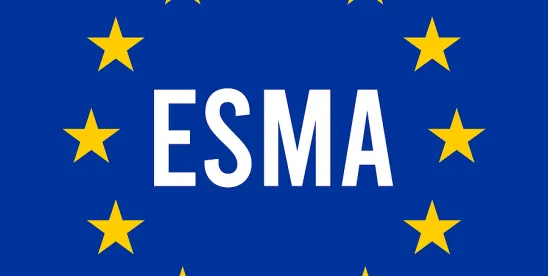ESMA Publishes Final Report on the Preparation of Securities Prospectuses
On 12 June 2025, the European Securities and Markets Authority (ESMA) published its final report with regulatory technical standards (RTS) for the preparation of securities prospectuses. This contains a proposed amendment to Delegated Regulation (EU) 2019/980, which contains the schedules for the content of securities prospectuses. This is intended to further elaborate and implement the amendments to the Prospectus Regulation, in particular due to the introduction of new prospectus types with the Listing Act adopted by the European Parliament on 14 November 2024.
The draft amendment to Delegated Regulation (EU) 2019/980 for European green bonds and nonequity securities that are advertised as considering Environmental, Social, and Governance (ESG) factors or pursuing ESG objectives provides for significant changes to the prospectus content. This applies in particular to information on the EU Taxonomy Regulation and on market standards or ESG labels. In addition, issuers of nonequity securities that are advertised as considering ESG factors or pursuing ESG objectives and that are based on an underlying asset (structured securities) must provide information on the extent to which this underlying asset is material for the assessment of the ESG factors or ESG objectives.
The European Commission now has three months to decide whether it will implement the final draft amendment to Delegated Regulation (EU) 2019/980.
ESMA Publishes Technical Advice on Harmonization of Prospectus Liability
On 12 June 2025, ESMA published technical advice on the further harmonization of civil liability in relation to securities prospectuses. A mandate from ESMA in this regard is provided for in the Prospectus Regulation following amendment by the Listing Act. To date, civil liability for prospectuses has largely been governed by the national laws of the member states. However, under the Prospectus Regulation, member states must establish a prospectus liability regime. ESMA had previously examined the liability regimes in the member states for its technical advice.
Like the market participants it consulted, ESMA does not see any fundamental need for reform or harmonization with regard to the prospectus liability rules. However, ESMA has identified two areas that it believes are worthy of discussion. Some prospectus liability regimes provide for an exemption (safe harbor rule) for forecasts in prospectuses, as these are generally inherently uncertain. ESMA proposes certain criteria and restrictions in the event that such a safe harbor rule should also be included in the prospectus liability provision (Article 11) of the Prospectus Regulation. ESMA also points out difficulties in determining the applicable national law in relation to prospectus liability claims. This is determined by the conflict rules of private international law (e.g., the Rome I and Rome II Regulations). In ESMA’s view, specific regulations for prospectus liability claims could be helpful here.
ESMA will publish its final report next.
BaFin’s Consultation on the Withdrawal of GwG Exemptions
On 6 June 2025, the German Federal Financial Supervisory Authority (Bundesanstalt für Finanzdienstleistungsaufsicht, or BaFin) started a hearing for a general ruling regarding the withdrawal of exemptions from the provisions of the German Anti-Money Laundering Act (Geldwäschegesetz, or GwG).
Under the version of the GwG in force until 20 August 2008, obliged entities could be exempted from the provisions of the GwG. BaFin and its predecessor authority had made use of this and issued corresponding exemption decisions, some of which are still valid today.
In light of the new EU Anti-Money Laundering Regulation, which will in general apply from 10 July 2025 and that also governs exemptions from the GwG obligations, BaFin no longer sees any scope for the continuation of the previously granted exemptions and plans to withdraw the exemptions by way of a general ruling by 10 July 2025.
ESMA Publishes Final Report on Active Account Requirement Under EMIR
On 19 June 2025, ESMA published its final report with RTS regarding the obligation to use an active account for OTC derivatives.
Financial counterparties and nonfinancial counterparties that are subject to the clearing obligation and exceed the clearing threshold for certain derivative contracts must maintain an active account with an authorized central counterparty for these derivative contracts in accordance with the European Market Infrastructure Regulation (EMIR) and clear a certain number of transactions on this account.
ESMA’s regulatory technical standards set out further requirements for the functionality and operation of active accounts, the conditions for stress tests, and the details of reporting in a draft delegated regulation. The requirements depend on the type of derivative and whether certain thresholds are reached.
The European Commission now has three months to decide on the adoption of the proposed Delegated Regulation.
ESMA Takes Action Against the Promotion of Unauthorized Financial Services
On 28 May 2025, ESMA sent a separate letter to the major social media providers asking them to take action against the promotion of unauthorized financial services. Accordingly, social media providers should take proactive steps to prevent the promotion of unauthorized financial services in the European Union. In particular, they should verify whether the firms that wish to promote a financial service on their platform have been authorized to provide investment services in the European Union or are acting on behalf of an authorized firm.





 />i
/>i
